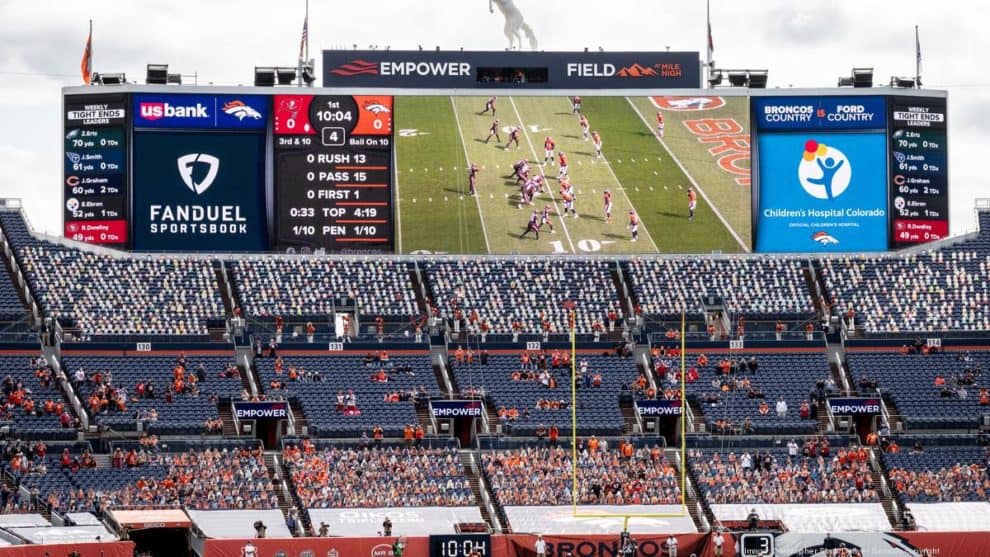
- The NFL is in the process of finalizing their initial league level policies regarding sports betting.
- As part of this process, the NFL will be forging their first league-wide sportsbook sponsorship deals.
- The NFL will also be launching a next gen live data feed for sportsbooks to upgrade their in-game wagering platforms.
One of the longest running opponents of sports betting freedom in the United States is preparing to jump on the gravy train. For years, the National Football League used high priced lawyers and curried favor from jock sniffing politicians to keep the country in the dark ages relative to sports betting. It took the Supreme Court decision overturning PASPA to put an end to their obstructionist stance and now the NFL is looking at the best way to maximize revenues from sports betting.
The backstory further underscores the opportunistic duplicity of the NFL. Even as they were trying to deny Americans their sports betting rights, they were laying the groundwork to profit from it. Sports Business Daily reports that as early as 2017, the league was commissioning a survey of pro football fans to get a sense of the popularity of sports betting. That’s somewhat ironic considering that the NFL was a niche sport at best until the confluence of betting and television launched it into the stratosphere. At one point, NFL commissioner Roger Goodell likely purjured himself by making the outlandish statement under oath in a Congressional testimony that sports betting had nothing to do with the popularity of the league.
Here’s what SBD says is about to happen:
By the end of March, the league will choose the distributor of the next generation of its live data feed, which will offer high-speed delivery of the granular information sportsbooks rely on to formulate odds and take the sort of in-game bets that many see as the future of their business. It won’t be long after that — likely sometime between the draft and the start of next season —that the NFL strikes its first leaguewide sponsorship deals in the category, which most other major U.S. leagues entered in 2018.
The NFL is about a year behind every other major North American sports league and while they try to pass this off as the result of a ‘deliberative process’ the more likely explanation is completely cluelessness. Even as the league tried to bury their heads in the sand and ignore the new realities of sports betting they were taking ‘baby steps’ to profit from it. They began to distribute live data to U.S. sportsbooks beginning in 2019 and opened sports betting as a sponsor category for its teams in 2020. 11 NFL teams now have promotional deals with sportsbooks.
Shad Khan, owner of the Jacksonville Jaguars and chairman of the NFL’s eight-member legal sports betting committee, is one of the sharper owners in the league and is forthright about the profit potential of sports betting:
“Over the long haul, in all candor, the NFL doesn’t leave a lot of money on the table. So whatever we’re doing, it’s going to more than make up for [the time it has taken]. We’re not walking over $100 bills to pick up pennies. We’re walking over pennies to pick up $100 bills.”
Patriots President Jonathan Kraft also serves on the legal sports betting committee and he observes that the mood among the owners changed very quickly when PASPA was overturned and they got a whiff of the money they could be making:
“Before PASPA was overturned, in the year leading up to that and even in the 12 to 18 months after it, the feeling in the room was dramatically different than it is today. People understand now that this is going to be part of the day-to-day nomenclature and of states’ budgets. Now the focus is very much on developing the best products for our fan base while making sure the business deals benefit the league as best as they can.”
It took the league a while to get here. Their first response was an adversarial one as they tried their usual recourse of strong arm tactics to try and mandate nonsense like ‘integrity fees’ and tried to get the requirement that sportsbooks buy ‘official league data’ directly from them codified into states’ sports betting regulations. For the most part, it didn’t work. The news strategy is the smart one. There’s plenty of money on the table for everyone and finally the league has woken up to realize that they’re not controlling the process here.









